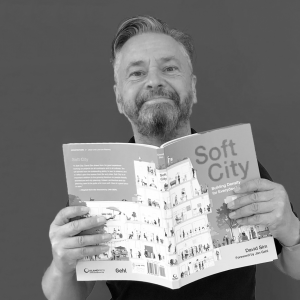Lecture “Soft City”
David Sim worked for Ralph Erskine in Sweden for many years and moved on to Jan Gehl’s architecture office in Denmark, where he also worked as a partner for many years and where the book “Soft City” was born. David Sim believes that creating a good city is like organizing a great party; the author takes a simple, humane and apt approach to complex topics.
With some 20 translations to date, Soft City has established David Sim as a thought-leader in urban livability and sustainability planning. David started his architecture studies in Scotland but after hearing Jan Gehl’s lectures he moved to Scandinavia to complete his education.
After a distinguished teaching career at Lund University in Sweden, he spent 18 years at Gehl, seeing it grow from 4 people in an attic to the world brand with offices in Copenhagen, New York and San Francisco.
A well-respected practitioner, David Sim has an impressive portfolio of master plans, urban strategies and design work across the globe, from the Highlands of Scotland to the lakes of Patagonia and from the suburbs of Melbourne to downtown Tokyo.
He has developed numerous collaboration and engagement tools while rethinking master plans to deliver denser and more diverse urban places while maintaining a human scale. He led the recovery plan for Christchurch Central City after the devastating 2011 earthquake, as seen in the award-winning documentary “The Human Scale”. In 2021 David Sim was awarded a prestigious Honorary Fellowship of the Royal Incorporation of Architects in Scotland.
Based in Sweden, David Sim now works as a Senior expert for Gehl as well as independently with his own consultancy company, making cities, towns and villages softer.
David Sim will give a lecture at EKA, in which he will look at the main issues of his book “Soft City” – now also available in Estonian – from the perspective of health. In the book, Sim addresses today’s biggest challenges – how to ensure and improve the quality of life of people in a growing city, in the context of the climate change and the digital society through creating a quality living environment. We’ll be talking about Scandinavian human-centered and human-dimensioned urban planning, which aims to support a local, functional and sustainable – healthy – living environment. Sims addresses in parallel both social, spatial and environmental issues, juxtaposing theory and ideals with real-world examples and solutions from existing environments around the world. Listeners and readers do not need to have prior knowledge of urban planning, but on the other hand, this book makes for an effective tool for professionals dealing with the design of the built environment at different levels. Both Thursday’s lecture and the book are particularly timely because of climate change issues, offering modern solutions to make the urban environment more resilient and at the same time serving the community and people: everyday urban lives in our climate can still offer pleasure, health and joy.
